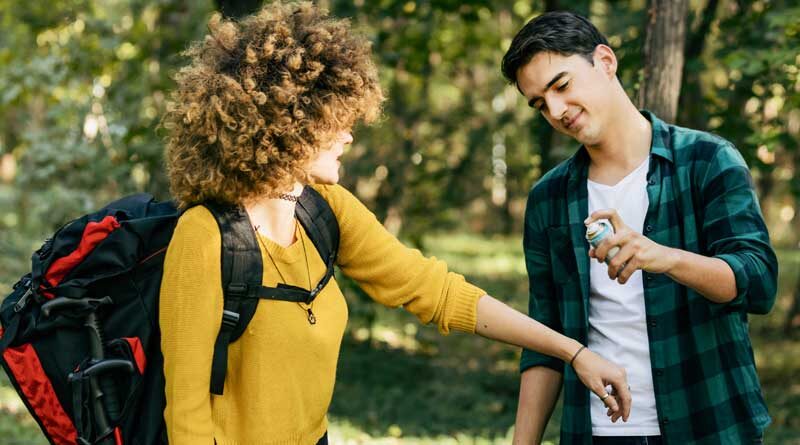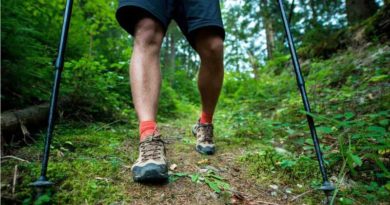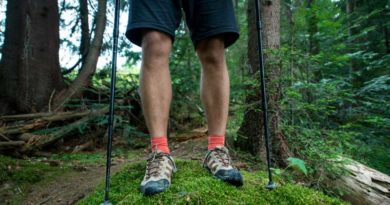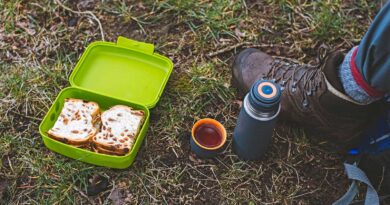How to Repel Mosquitoes while Hiking?
Most of the time insects in the wilderness are an annoyance rather than a danger. The buzz around your ears cause itchy red bumps and may even bite through your clothing. But insects like mosquitoes and ticks can also be carriers of diseases and viruses. So it’s best to repel them and protect yourself whenever possible. Fortunately, there are a few common avoidance strategies and chemical treatments that will help greatly reduce insect problems and will often lead to bite-free trips.
Chemical Treatment
To repel mosquitoes, use a couple of chemical treatments to greatly increase your bug protection almost to 100%. DEET and Permethrin are generally considered the two most effective chemical treatments in bug protection. DEET is a repellent that goes on your skin and Permethrin is a treatment that goes on your clothing. Both are effective against a wide range of insects.
DEET
DEET is a strong chemical repellent that should only be used on exposed skin. Products with higher concentrations of DEET will last longer than products with lower concentrations. Well, they both had the same effectiveness. Recent studies have shown that using a formula with 30-35% DEET is about as effective as it gets. DEET is effective against mosquitoes, ticks, biting flies, spiders, bees, and other insects. It is a reliable repellent but it’s also a pretty harsh chemical so many people try and use it as little as possible. DEET can be damaging to plastic, leather, and synthetic fabrics. So be careful not to get it on your stuff. Keep DEET away from your mouth, eyes, ears, and nose. Don’t spray it on any open wounds or rashes. Be careful not to inhale it or spray it directly on your face and wash your hands thoroughly before eating food.
It’s also a good idea to avoid multi-use products like a DEET-sunscreen mix. Instead, apply your sunscreen, let it absorb, and then add DEET as necessary.
Permethrin
Permethrin is a treatment that should be used on your hiking clothing. Some clothing even comes pretreated. It quickly forms a strong bond with your clothing when it dries and it isn’t easily absorbed by your skin or water. A Permethrin spray treatment can last up to six weeks and will even last through multiple washes. Permethrin repels and kills mites, ticks, chiggers, and mosquitoes. A combination of DEET and Permethrin is about as close as you can get to total insect protection. Studies have shown that combination to be nearly 100% effective over 8 hours in areas heavily populated by mosquitoes.
Other ways to avoid Mosquitoes
Along with the chemical treatment, there are a few other ways to avoid bugs while you hiking.
Wear Long Sleeve Clothing
One of the best ways to avoid bug annoyances is to avoid bugs altogether. Fall, winter, and early spring are generally cooler times of the year when fewer bugs will be active. You can limit bug exposure by wearing long sleeve clothing with a tight enough weave so that insects like mosquitoes won’t be able to bite through it.
Bring Mesh Bug Clothing
If you’re easily annoyed by insects, consider bringing lightweight mesh bug clothing. But you prefer not to wear repellent. This is a cheap, light, and effective method.
Avoid Perfumes and Scents
Avoid all perfumes and scents when you backpack. Even fragrant fabric softeners and dryer sheets can attract insects.
Keep yourself clean
Mosquitoes and other insects are drawn to the ammonia in your sweat and your odor.
Avoid Hiking at Dawn and Dusk
Avoid hiking at dawn and dusk when they’ll be the most active and also avoid camping near standing water, which they need to reproduce. Try to camp in an area with a stiff breeze to limit your bug exposure.
Avoid Ticks
To avoid ticks, keep away from brushy areas and tall grass. Check your body for ticks when you stop for breaks. If you find a tick on your body use a pair of tweezers to grasp it as close as you can to the skin and pull away evenly. Don’t twist or yank. After removal, wash the area thoroughly. If you develop a rash or fever, see your doctor.
Bring EpiPen
You should also know how allergic you are to be stung. If you’re allergic, you should bring an EpiPen and know how to use it. If you get stung by a bee, pull out the stinger as quickly as you can with your fingers use a cold compress to ease the pain, and take an antihistamine or painkiller as necessary.
Conclusion
Remember, with insects, a little knowledge and preparation will go a long way. Bite and itch-free trips will be your new standard.




